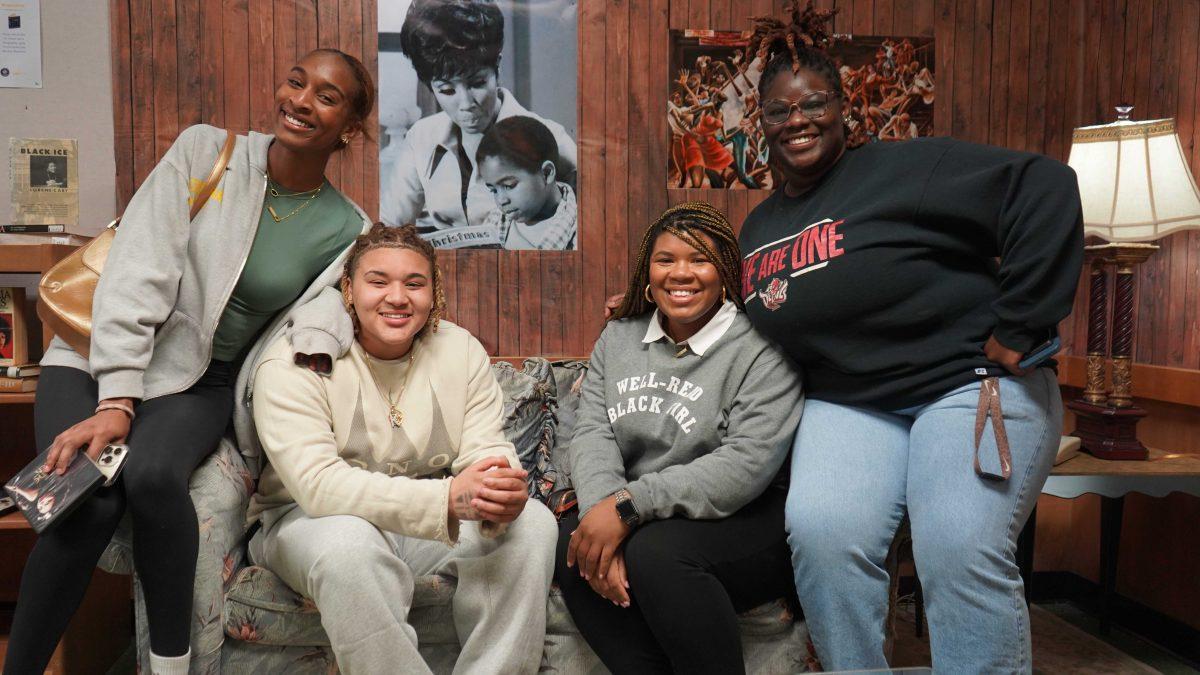The LSU Main Library recently opened a new exhibition on the second floor that recreates a sitcom version of the Black living room. It’s based on mass communication professor Asha Winfield’s dissertation, “I Don’t See Myself”: Exploring Reception to Hollywood’s Construction of Memory Through Black Women’s Biopics. The Storytellers Lab, a research group founded by Winfield, is hosting a Black Women’s Biopics series to highlight the stories of Black Women.
“I wanted to create a space that celebrated all the things that we love about Black women,” Winfield said. “Our histories, our stories, our lived experiences, but also our media. Whether that’s our song or dance, our culture, the aesthetic, all of it. I wanted to recreate this sitcom version of a living room where people would feel invited to come into the space to talk about Black women in the media.”
Tiffany R. Smith is a media and public affairs doctoral student at LSU and Winfield’s graduate assistant of two years. Now, Winfield is the chair for Smith’s dissertation committee. Smith discussed the need for more representation and accurate portrayals of Black women’s lives in film and media.
“Biopics are so important because I think it’s an attempt to tell the real-life stories of women,” Smith said. “It is important for us to see Black stories in general. Black women’s stories particularly don’t get shown, especially when it comes to their real lives. I think that biopics have helped even those that are still living see how great they were even back then.”
Winfield hopes that everyone who visits the exhibit will be able to learn something from it.
“I just want them to sit and engage,” Winfield said. “I want them to think about their consumption, but I also want them to feel comfortable. I want them to feel welcome enough to sit on the sofa or pop something in the VCR and watch it on the big television that we have there. I want them to feel like they’re at home.”
Black women’s stories and histories are crucial to media representation, and accurate storytelling requires creative autonomy and engagement with lived experiences. Sanaa Dotson, a liberal arts master’s student, discussed her thoughts on the entertainment industry’s representation.
“I think it’s an area where we’re seeing more people produce,” Dotson said. “But, I feel like Black women in particular, there aren’t a lot of stories that highlight them. Black women played such a big part in history and culture. So, giving them a chance to share their stories in a positive light and getting them more publicized is something that’s super important.”
The Black living room pedagogy started during conversations Winfield had during her Black women focus groups during the COVID-19 lockdown. The women realized they were all watching Black biopics with their families.
“In every group, they talked about how they were intentionally watching Black biopics and historical dramas with their family,” Winfield said. “I would watch Black biopics with my parents to ask them questions because they had lived through it.”
Winfield said watching biopics in a family setting serves as an opportunity to learn more about Black American history.
“There are also times, specifically with Black women’s biopics, that when we watch it, we also question our own identity,” she said. “‘How does this story impact how I live my life, how I lived my life?’”
As part of the series, the group will be hosting a screening of Aretha Franklin’s Respect with special guests, LSU faculty Meghan Sanders and Teairra Evans. It will be from 5:30 p.m. to 9:00 p.m. on Friday in Hill Memorial Library.








